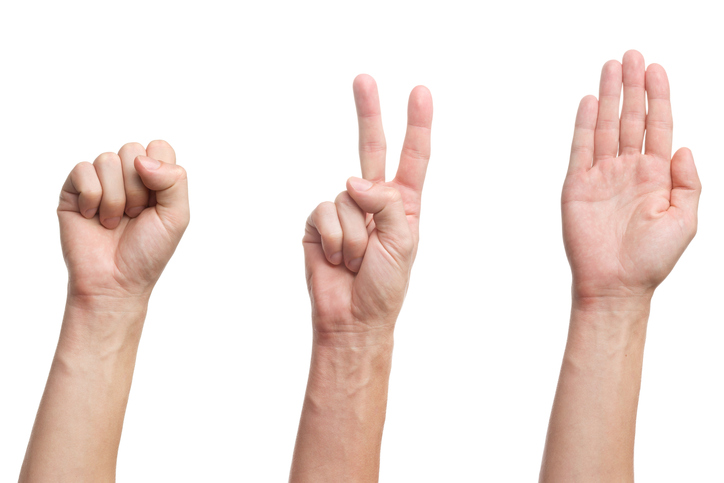Put that competitive instinct and that deep-seated pathological need to win to the test: Here are some ways to increase the likelihood you’ll win at that classic battle of weapons and wits: Rock, Paper, Scissors. (This article was first published in our 31st annual edition, Uncle John’s Actual and Factual Bathroom Reader.)
THE MIND-CONTROL METHOD
Most people are just casual Rock, Paper, Scissors players. If you’re going to take the game seriously, then you’ve already got an advantage over a relative novice…and you can exploit their newness, because it’s a weakness. If your adversary is a newbie, explain the game; if they’re a casual RPS’er, give a refresher course. As you do, use hand gestures to demonstrate your point. For example, when you mention that rock defeats scissors, make the scissors sign with your hand. Then, explain that scissors beats paper. Once again, make the scissors sign. That back-to-back repetition of scissors will stick in your opponent’s head, and they’re much more likely to throw a scissors the first time you play for real. Expecting that, throw rock. You win.
KNOW YOUR STATISTICS
According to the experts, “rock” is the most commonly thrown first move. Knowing that, you should throw paper. If the odds are in your favor, your paper covers their rock. You win. Rock is an even more common initial move among men, while casual female players statistically choose scissors on their first go-around. If you’re playing against a novice lady competitor, throw rock. You win.
WATCH FOR PATTERNS
Many players will try to get into your head by throwing down the same thing two times in a row—two rocks, two papers, or two scissors. However, studies show that the likelihood of a player going for the same play three times in a row are slim. That means you can mentally eliminate the thing they did twice from the possibilities of what they’ll throw on round three. For example, if they did scissors, and then scissors again, they’re probably going to go for paper or rock at that point, so throw accordingly (scissors or paper, respectively). You win. (Or tie.)
THE HUBRIS FACTOR
Experienced players, such as anyone who’s read this cheat sheet, are unlikely to throw a rock first—they’re too prideful. Only rookies go for a rock on the first time. So that’s one of three possibilities that can be eliminated already. But pride factors in once more. Because the experienced player is so confident in their abilities, they’ll assume everyone else is a newbie, which means they assume you’re going to throw rock. That means they will throw a victorious paper…except you knew that, so you go for scissors. You win.
DISARM THEM WITH A LIE
Here’s a trick that will bewilder your opponent regardless of their skill level: Tell them what you’re going to throw before you throw it. And then do something else? Nope—stick to your word. They’ll think that you’re messing with them, which you are, but not the way they assume. They’ll think that by announcing “rock,” for example, it means you’re going to play something else. Predicting you’ll give them scissors or paper, they’ll throw rock or scissors to win. But then when you actually do throw rock, you either beat their scissors or tie with their rock.
LET THEM “TELL” YOU
Just like most poker players have a “tell” when they’ve got a good hand, Rock, Paper, Scissors players may demonstrate some kind of physical indication that can be used to predict what they’re going to throw. It’s all about the way they hold their hand. Does it look like they’re holding their hand in a loose fist? That’s a hint they’re looking to make their hand go flat fast for paper. Do they have their thumb resting on top of their fist? That looks like a rock. A hand with the first two fingers held loosely is an almost surefire tell that the opponent will pick scissors.
GET THEM ANGRY
If you use all of these tricks and just keep beating your opponent no matter what they throw, they’re likely to get frustrated. And when they throw their next hand, they’re likely to throw rock—it’s subconsciously and psychologically the most aggressive option. But then, you knew they were going to do that, and you’ve got paper ready. You win.









